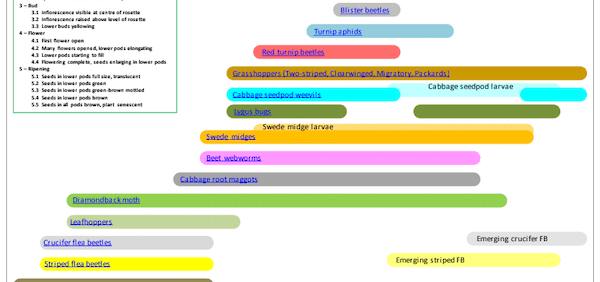China's Canola Search: New Sources After Canada Rift

Table of Contents
The Canada-China Canola Dispute: A Deep Dive
The Canada-China canola trade dispute represents a significant disruption in global agricultural trade. The relationship, once characterized by substantial canola exports from Canada to China, soured significantly in recent years. The escalation began in 2019 with increasing scrutiny and restrictions imposed by China on Canadian canola imports.
-
Timeline of Events:
- March 2019: China initiated investigations into Canadian canola shipments, citing concerns about pest infestations.
- July 2019: China formally suspended imports from two major Canadian canola exporters.
- August 2019: Further restrictions were placed on all Canadian canola imports, effectively creating an import ban.
- Ongoing: Despite ongoing diplomatic efforts, the ban remains in place, significantly impacting Canadian canola producers and the global canola market.
-
Accusations and Responses:
- China's Accusations: China claimed to have found various pests and contaminants in Canadian canola shipments, posing a threat to its agricultural sector. These claims were contested by Canada.
- Canada's Response: Canada maintained that the claims lacked scientific evidence and suggested the restrictions were politically motivated, potentially linked to broader geopolitical tensions between the two countries. This led to accusations of trade sanctions and an agricultural trade war.
Exploring Alternative Canola Sources for China
With Canadian canola effectively blocked, China has actively sought alternative sources to meet its substantial demand for canola oil and meal. Several countries are emerging as potential suppliers, each presenting unique advantages and challenges.
Australia: A Rising Star in Canola Exports
Australia possesses significant potential to fill the gap left by Canada. Its canola production is substantial, and it shares a relatively stable trading relationship with China.
- Australian Canola Production & Export Capacity: Australia is a significant canola producer, with the capacity to substantially increase exports to China.
- Transport Costs and Trade Agreements: While shipping costs from Australia to China are higher than from Canada, existing trade agreements and infrastructure can facilitate increased exports.
- Potential for Increased Trade: The situation represents a considerable opportunity for Australia to strengthen its position in the global canola market and cement its ties with China.
Ukraine: A Geopolitically Complex Supplier
Ukraine also presents itself as a potential source of canola for China, boasting considerable production capacity. However, geopolitical considerations introduce significant uncertainties.
- Ukrainian Canola Production and Export Infrastructure: Ukraine has a well-established agricultural sector and a capable export infrastructure, particularly regarding Black Sea grain exports.
- Political Stability and Logistical Challenges: The ongoing conflict in Ukraine presents major logistical challenges and raises concerns about the reliability of supply. The war has severely impacted agricultural production and export capabilities.
- Risks and Uncertainties: Political instability, infrastructure damage, and ongoing conflict significantly increase the risks associated with relying on Ukrainian canola.
Other Potential Suppliers: A Mix of Options
Other countries, including Russia, Brazil, and members of the European Union (EU), are also in the running to provide canola to China, although they may not be as ideal as Australia, in terms of logistical considerations.
- Russia: Significant canola production, but existing political tensions may complicate trade relations.
- Brazil: Growing canola production, but geographical distance poses a significant challenge.
- EU: Diverse production across member states, but regulatory requirements and export capacity could limit their contribution.
Implications for the Global Canola Market
China's search for new canola sources has created significant ripples throughout the global market. The demand shift will inevitably influence canola prices and market shares.
- Global Canola Prices: Increased demand from China could lead to higher global canola prices, benefiting producing countries but potentially harming importing nations.
- Market Volatility: The disruption in supply chains has increased market volatility, making it challenging for businesses to plan and manage their operations.
- Shifts in Trade Relationships: The search for new canola sources is reshaping global trade relationships, leading to increased competition and the forging of new partnerships.
China's Long-Term Canola Strategy
China's response to the Canada canola rift suggests a long-term shift in its agricultural import strategy.
- Import Diversification: China will likely prioritize diversifying its canola imports to reduce dependence on any single supplier.
- Domestic Canola Production: Investing in domestic canola production will increase self-sufficiency, mitigating the risks associated with international trade disputes.
- Long-Term Partnerships: China will seek to establish stable and reliable long-term partnerships with new canola suppliers.
Conclusion
China's search for alternative canola sources following the Canada rift has created a dynamic shift in the global canola market. The implications are significant, impacting global canola prices, trade relationships, and the strategies of canola-producing nations. Understanding China's long-term canola strategy is crucial for navigating the evolving landscape of this vital agricultural commodity. Stay informed about the evolving situation in China's canola market and the impact on global trade. Further research on China's agricultural policies and strategies is crucial for understanding future developments in the global canola supply chain. Follow our blog for further updates on China's canola search and other crucial developments in the agricultural sector.

Featured Posts
-
 Nottingham Attack Survivor First Interview Reveals Heartbreaking Wish
May 10, 2025
Nottingham Attack Survivor First Interview Reveals Heartbreaking Wish
May 10, 2025 -
 Barbashevs Ot Heroics Send Vegas Golden Knights And Minnesota Wild To Game 5
May 10, 2025
Barbashevs Ot Heroics Send Vegas Golden Knights And Minnesota Wild To Game 5
May 10, 2025 -
 Brutal Racist Attack Family Left Shattered
May 10, 2025
Brutal Racist Attack Family Left Shattered
May 10, 2025 -
 The Bangkok Post And The Fight For Transgender Rights
May 10, 2025
The Bangkok Post And The Fight For Transgender Rights
May 10, 2025 -
 10 Unmissable Film Noir Movies For Every Fan
May 10, 2025
10 Unmissable Film Noir Movies For Every Fan
May 10, 2025
